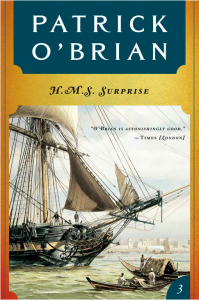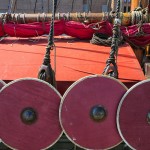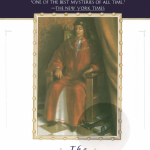 Last week and the week before I reviewed the first two books in Patrick O’Brian’s Aubrey/Maturin series of sea stories, Master and Commander and Post Captain, two books I enjoy greatly, but which have pitfalls for the unwary reader. In those reviews I tried to highlight those pitfalls, and explain them; so that, being forearmed, as it were, readers who had tried O’Brian and failed to appreciate them might try, try again and make it through.
Last week and the week before I reviewed the first two books in Patrick O’Brian’s Aubrey/Maturin series of sea stories, Master and Commander and Post Captain, two books I enjoy greatly, but which have pitfalls for the unwary reader. In those reviews I tried to highlight those pitfalls, and explain them; so that, being forearmed, as it were, readers who had tried O’Brian and failed to appreciate them might try, try again and make it through.
H.M.S. Surprise, one of my favorite books of all time, is the reward for having made it through. If you carry on through the first two books with undaunted courage, and having embarked the joyful Surprise still sink into the depths, then I’m done with you; there’s nothing for you here; go read something else, though the world be poorer for it. Alas.
As usual, there is the outer story and the inner story. In the outer story, Jack Aubrey is given command of the Surprise, a small frigate that surprisingly is historical. Built as the Unité by the French, she was captured by the English and renamed the Surprise; and under Captain Hamilton, she was the ship that recaptured the Hermione and her mutinous crew (and there’s a lurid tale for you; see Dudley Pope’s The Black Ship for the historical details). Jack was a midshipman on the Surprise (she’s the ship on which he was turned before the mast for hiding a damsel in the cable tier), and so this assignment is something of a homecoming.
The inner story concerns Stephen Maturin, who was revealed in the previous volume as a spy and agent of the Admiralty’s intelligence branch. He’s especially interested in Catalan independence, having lived for many years in that part of Spain; but recent events have made him too noticeable, and it’s important to re-establish his credentials as a naturalist (which is to say, as a highly educated but completely ineffectual kook in the eyes of most, and hence harmless).
The Admiralty achieves this by sending Stephen on a journey to the Far East, accompanying an envoy to the Sultan of Kampong; and because Stephen trusts him, Jack Aubrey is given command. (It’s really quite funny how influential Stephen’s career as an agent affects Jack’s fortunes, and how little Jack knows about the details.)
And so we have a long, slowly journey down the Atlantic, and across the equator to the Southern Ocean; and across to India, and further east; and so home. We deal with scurvy and storms; we see the albatross; we watch Stephen becoming acquainted with the life and ways of the folk of India; and we learn of the joys, trials, and fears of the captain of an East Indiaman, one of the great trade ships that made Britain one of the economic powerhouses of the day.
Diana Villiers is in India, of course, in the keeping of her paramour; and of course Stephen has known about this even before the mission began; and of course he can’t keep away, despite Jack’s frantic attempts to refit surprise and leave town before any meetings can happen.
The narrative structure of H.M.S. Surprise is much simpler than that of Post Captain, and the inner and outer stories run on parallel tracks, working together rather than at cross-purposes; it’s an easier book to follow than its predecessors, and (to me) is a delight from one end to another.
I’ll end with a brief excerpt. While touching on the coast of Brazil to acquire fresh food (so as to deal with scurvy), Stephen finds a sloth and brings it back to the ship. It soon becomes a favorite of everyone but Jack Aubrey: whenever the sloth sees Jack it hides its face.
‘I cannot imagine,’ said Jack, recovering the chaplain and guiding him along the gangway, ‘what that sloth has against me. I have always been civil to it, more than civil; but nothing answers. I cannot think why you speak of its discrimination.’
Jack was of a sanguine temperament; he liked most people and he was surprised when they did not like him. This readiness to be pleased had been damaged of recent years, but it remained intact as far as horses, dogs and sloths were concerned; it wounded him to see tears come into the creature’s eyes when he walked into the cabin, and he laid himself out to be agreeable. As they ran down to Rio he sat with it at odd moments, addressing it in Portuguese, more or less, and feeding it with offerings that it sometimes ate, sometimes allowed to drool slowly from its mouth; but it was not until they were approaching Capricorn, with Rio no great distance on the starboard bow, that he found it respond.
The weather had freshened almost to coldness, for the wind was coming more easterly, from the chilly currents between Tristan and the Cape; the sloth was amazed by the change; it shunned the deck and spent its time below. Jack was in his cabin, pricking the chart with less satisfaction than he could have wished: progress, slow, serious trouble with the mainmast – unaccountable headwinds by night – and sipping a glass of grog; Stephen was in the mizzentop, teaching Bonden to write and scanning the sea for his first albatross. The sloth sneezed, and looking up, Jack caught its gaze fixed upon him; its inverted face had an expression of anxiety and concern. ‘Try a piece of this, old cock,’ he said, dipping his cake in the grog and proffering the sop. ‘It might put a little heart into you.’ The sloth sighed, closed its eyes, but gently absorbed the piece, and sighed again.
Some minutes later he felt a touch on his knee: the sloth had silently climbed down and it was standing there, its beady eyes looking up into his face, bright with expectation. More cake, more grog: growing confidence and esteem. After this, as soon as the drum had beat the retreat, the sloth would meet him, hurrying towards the door on its uneven legs: it was given its own bowl, and it would grip it with its claws, lowering its round face into it and pursing its lips to drink (its tongue was too short to lap). Sometimes it went to sleep in this position, bowed over the emptiness.
‘IN THIS BUCKET,’ said Stephen, walking into the cabin, ‘in this small half-bucket, now, I have the population of Dublin, London and Paris combined: these animalculae – what is the matter with the sloth?’ It was curled on Jack’s knee, breathing heavily: its bowl and Jack’s glass stood empty on the table. Stephen picked it up, peered into its affable, bleary face, shook it, and hung it upon its rope. It seized hold with one fore and one hind foot, letting the others dangle limp, and went to sleep. Stephen looked sharply round, saw the decanter, smelt to the sloth, and cried, ‘Jack, you have debauched my sloth.’
That cry, that impassioned cry, “Jack, you have debauched my sloth!” I know it’s coming, and it always makes me giggle.











